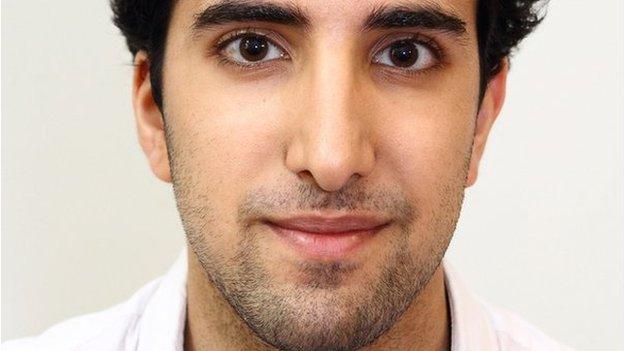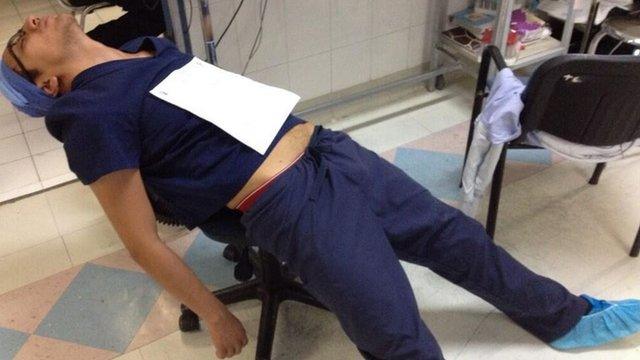Junior doctor: The first week
- Published

Every August, thousands of newly qualified doctors start work in hospitals across the country.
Their journey after medical school begins with a two-year foundation programme, where they rotate through a number of specialities in four- or six-month posts.
Dr Arrash Yassaee, a graduate from Cambridge University and UCL Medical School, describes his first week on the front line.

Monday
For the past few days, I have been shadowing my predecessor to learn the ropes under direct supervision.
I am a foundation year-one doctor (F1) at Newham University Hospital in east London, where for the next four months I will be working in diabetes and endocrinology.
My day starts at 08:00 with a simulated on-call session sending me around the wards to undertake a variety of tasks I could face in the future when I fully take the reins.
Throughout the session, I am bleeped and given additional tasks to add to my rapidly growing to-do list.
One of the main lessons is simply there is always more to do than time allows.

Tuesday
Alongside the other F1s, I am in at 09:00 for morning handover.
Throughout our final day of shadowing, it is increasingly hands-off.
And at 18:00, when I've completed the final discharge summary, it is: "Thank you and farewell."
Being a doctor starts from tomorrow, and it is all getting very real now.

Wednesday
The training wheels are off - it is day one.
I am in for 08:00 to sort out a referral to palliative care for a patient with terminal cancer.
Only an hour later, a palliative care nurse bleeps me - our patient's symptoms are worsening and her prognosis has changed from months to days.
We discuss the situation with her family and all agree our priority now is to keep her comfortable.
From 17:00, I am one of a handful of doctors on call, providing medical cover for the hospital wards.
The first few hours are simple:
a patient needs a cannula
results need reviewing
medications need rewriting
But two hours in, I am asked to see an elderly lady short of breath.
I notice her blood-oxygen levels are lower than any simulation I had done in medical school, and I call for the senior doctor on call, who meets me on the ward within two minutes.
With him taking the lead, we stabilise the patient and he explains the situation to the family.
The rest of the shift is incredibly busy.
During one phone call alone, I am bleeped five times.
I have time for only the most urgent tasks and begin apologising to those asking me to rewrite medications and to a nurse who asks me to certify the death of an elderly lady who had just passed away.
At one point, the dreaded announcement of: "Cardiac arrest," rings through the hospital, and we frantically run over to A&E.
At 22:00, it is the end of my shift.
I hand over the remaining jobs to the night team and leave absolutely shattered from being on my feet for 12 hours, dreading the thought of travelling home during a Tube strike.
Luckily, an A&E consultant offers me a lift back.
She congratulates me on surviving my first day, assuring me it really does get easier.

Thursday
Thursday was a quieter day.
After a few discharges, our patient list shrunk significantly, and there are only a few jobs to do in the afternoon.
It is probably one of the few times I will get to go home on time.
That evening, I go to a regional meeting at the British Medical Association, which represents all doctors in the UK.
At the start, everyone introduces themselves by name and training grade.
On my turn, the words :"I'm Arrash, and my first day was yesterday," are greeted with a resounding cheer, and it finally sinks in - I am a doctor.

Friday
My colleagues and I came in on Friday to the sad news our patient with cancer died last night.
Having spoken to the family every day this week, my priority is to see them and complete the death certificate.
We practise these difficult conversations in medical school, but, just as with being on call, nothing prepares you for the real thing.
You can rehearse explanations of cause of death, you can have prepared statements on pain relief, but when this family told me their loved one had mistaken me for a long-lost relative, and thanked me for the comfort this had brought her in her final days, there was no template to help me respond.
It is such moments of genuine compassion that help you through the long days and demanding workloads and, on a daily basis, drive medical staff across the country to stay long after their shifts are due to finish.
Throughout the rest of the day, that conversation plays in my mind.
Our diagnostics will always improve, our administrative workload will - hopefully - become smoother, but for next year's newly qualified doctors, I don't think those conversations will get any easier.
That is why, despite negative reports in the media about the future of our healthcare system and its workforce, medicine is still so very special, and I am incredibly excited and deeply proud to now be a part of it.
- Published16 May 2015

- Published7 August 2015